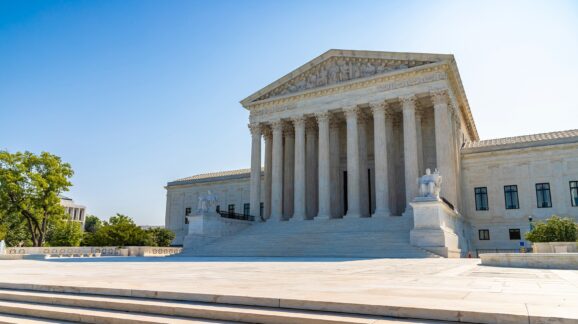Supreme Court hears challenge to a provision of 2017 law that taxes unrealized income

Photo Credit: Getty
Today the U.S. Supreme Court heard arguments on behalf of Charles and Kathleen Moore, taxpayers who are challenging a provision of the 2017 Tax Cuts and Jobs Act that led to them receiving a tax bill for owning shares in a foreign corporation, even though they received no income from the investment.
Represented by attorneys from BakerHostetler and the Competitive Enterprise Institute (CEI) in Moore v. U.S., the Moores are appealing a decision by the Ninth Circuit Court of Appeals upholding the Mandatory Repatriation Tax (MRT) as an income tax, despite that it taxes the ownership of property. The U.S. Constitution requires federal taxes on property or wealth to be apportioned among the states by population, which the MRT is not.
The Moores are a retired couple living in Washington state, where Charles worked in software development. In the early 2000s, the Moores decided to invest in a company founded by Ravindra “Ravi” Kumar Agrawal, a former colleague of Charles. The company, KisanKraft, was founded to provide individual farmers in India’s most impoverished regions with basic tools and equipment that were readily available in the U.S., but not in India. The Moores were moved by Ravi’s vision of empowering India’s rural farmers to improve their livelihoods and contributed $40,000 to help found the company.
The company was profitable almost from the start, and its revenues increased every year since its founding. True to Ravi’s original business plan, KisanKraft reinvested all its earnings to grow the business, which has expanded to serve farmers across India. Even though the Moores received (and paid) a tax bill of $14,279 based on their $40,000 investment and triggered by the MRT, they had never received any dividends, distributions, or payments from that investment that could generate any income tax liability.
“In 2018, Charles and Kathleen Moore learned that – because of the Mandatory Repatriation Tax – they had to pay income tax on a stock investment, even though they realized absolutely nothing on it. We believe the Constitution prevents Congress from levying this kind of tax on the Moores – because the Moores never realized any income,” said CEI General Counsel and attorney for the Moores Dan Greenberg. “The Mandatory Repatriation Tax implies that the government can ignore the income tax requirement of realized income, and we think that is impermissible. We appreciate the opportunity to defend the interests of our clients before the Supreme Court and to present our views on federal taxation’s constitutional requirements. We’re optimistic that the Court will agree that the tax that the Moores had to bear is constitutionally defective.”
“The word ‘income’ in the Sixteenth Amendment means the same thing today that it meant in 1913: economic gains coming in to the taxpayer. That’s why appreciation in the value of a home, a stock investment, or other property is not and never has been taxed as income,” said Partner at BakerHostetler and attorney for the Moores Andrew M. Grossman. “Without the need for income to be realized by taxpayers for Congress to tax them on it, all bets are off. We are hopeful that the Court will follow the original meaning of the Amendment and reaffirm that there is no income without realization.”
The Supreme Court will issue a decision in Moore v. U.S. in 2024.
More from CEI: